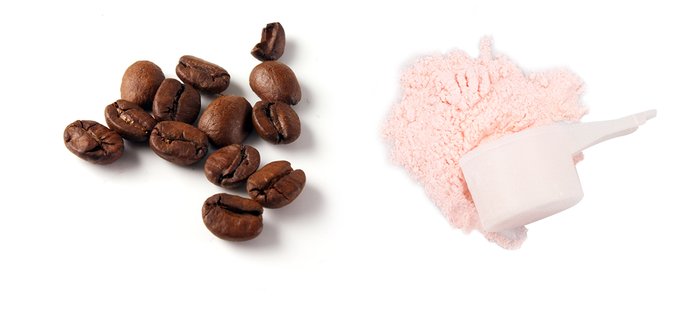Caffeine is right up there with salt and water as one of the bedrocks of the human diet. In fact, caffeine is the world's most frequently consumed ingredient.[1] You can find it in coffee, tea, soda, chocolate, alcohol, ice cream, pain relievers, and breath fresheners. It's even finding its way into unexpected places like specially formulated sunflower seeds, beef jerky, oatmeal, and, yes, water. And, of course, caffeine is in lots of sports nutrition products.
And why not? No matter how you consume it, caffeine can increase your mental acuity, improve your mood, and ratchet up your performance. What's not to like? But, given its popularity inside the gym and out, you'd think we'd all know everything about this wondrous substance. And yet the caffeine myths persist. Here's my take on four of the most common ones.

Myth 1: Caffeine Causes Dehydration
Most people who drink coffee regularly know from experience that caffeine can have a strong diuretic effect, meaning it can make you urinate. If you partake in activities that make it hard to continually replenish your fluids, this can be cause for concern since dehydration and fluid loss can affect athletic performance.
But, since most people get their caffeine from drinking coffee, black tea, or a pre-workout, the water they consume as a part of those beverages makes up for some of this fluid loss. Studies have found that a 155-pound person can drink as many as 7 cups (about 600 milligrams of caffeine) of coffee a day without experiencing a significant increase in fluid loss.[2-4]
Even if you did experience increased urination or fluid loss, you'd just have to drink an extra 8 ounces of water or so for every 100 milligrams of caffeine you consume. Some people who drink a lot of coffee can even build up resistance to the potentially dehydrating effects of caffeine.[5]
Myth 2: Caffeine Is Bad for Your Heart
There is a traditional belief among cardiologists that caffeine consumption can lead to cardiovascular disease, but studies show that is not true for people who consume normal amounts of it.
A study of almost 50,000 coffee drinkers found no association between moderate caffeine intake (set at 10 cups per day in this study) and cardiovascular disease.[6] A Harvard University study also found no association between coffee consumption and coronary heart disease.[7]

Ultimately, the devil is in the dose. If you're drinking three pots of very strong coffee each day, you may want to cut back on your consumption, but 2-3 cups a day won't hurt.
Myth 3: There's No Caffeine in Decaf Coffee
When people who enjoy coffee are sometimes asked to avoid it for various reasons (allergies, interactions with other medications, certain illnesses, during pregnancy), they usually switch to decaffeinated coffee. But "decaffeinated" isn't the same as caffeine-free. The U.S. Food & Drug Administration regulations specify that coffee makers must remove 97 percent of the caffeine for a coffee to be considered decaffeinated. University of Florida researchers found up to 15 milligrams of caffeine in 16 ounces of a commercial "decaffeinated" beverage.[7] That's not zero caffeine, but it is close.
Myth 4: Caffeine Is Addictive
It isn't uncommon to develop a tolerance to caffeine, which is why so many people need to drink more and more of it to get the same buzz. If you no longer get that familiar high from your cuppa joe, cut back on your intake for a few weeks.
Having said that, if you stop abruptly, you may experience withdrawal symptoms such as headaches, irritability, and difficulty concentrating in the short term.[8]
The good news is that these symptoms are usually short-lived. Once you start up again, the symptoms should diminish and your heightened sensitivity to caffeine reemerge. The less-than-good news is that along with this renewed caffeine sensitivity can come side effects, including sleep disruption, restlessness, and heightened feelings of stress.
Before you hit the gym, there's nothing more helpful than the kick you get from a good pre-workout. Just pay attention to how it—and caffeine in all its forms—affects your performance, sleep, appetite, and mood. As they say: Moderation in all things—including moderation.
References
- Nawrot, P., Jordan, S., Eastwood, J., Rotstein, J., Hugenholtz, A., & Feeley, M. (2003). Effects of caffeine on human health. Food Additives & Contaminants, 20(1), 1-30.
- Kovacs, E. M., Stegen, J. H., & Brouns, F. (1998). Effect of caffeinated drinks on substrate metabolism, caffeine excretion, and performance. Journal of Applied Physiology, 85(2), 709-715.
- Wemple, R. D., Lamb, D. R., & McKeever, K. H. (1997). Caffeine vs caffeine-free sports drinks: effects on urine production at rest and during prolonged exercise. International Journal of Sports Medicine, 18(01), 40-46.
- Falk, B., Burstein, R., Rosenblum, J., Shapiro, Y., Zylber-Katz, E., & Bashan, N. (1990). Effects of caffeine ingestion on body fluid balance and thermoregulation during exercise. Canadian Journal of Physiology and Pharmacology, 68(7), 889-892.
- Killer, S. C., Blannin, A. K., & Jeukendrup, A. E. (2014). No evidence of dehydration with moderate daily coffee intake: a counterbalanced cross-over study in a free-living population. PloS one, 9(1), e84154.
- Frost, L., & Vestergaard, P. (2005). Caffeine and risk of atrial fibrillation or flutter: the Danish Diet, Cancer, and Health Study. The American Journal of Clinical Nutrition, 81(3), 578-582.
- Willett, W. C., Stampfer, M. J., Manson, J. E., Colditz, G. A., Rosner, B. A., Speizer, F. E., & Hennekens, C. H. (1996). Coffee consumption and coronary heart disease in women: a ten-year follow-up. Jama, 275(6), 458-462.
- McCusker, R. R., Fuehrlein, B., Goldberger, B. A., Gold, M. S., & Cone, E. J. (2006). Caffeine content of decaffeinated coffee. Journal of Analytical Toxicology, 30(8), 611.
- Juliano, L. M., & Griffiths, R. R. (2004). A critical review of caffeine withdrawal: empirical validation of symptoms and signs, incidence, severity, and associated features. Psychopharmacology, 176(1), 1-29.

